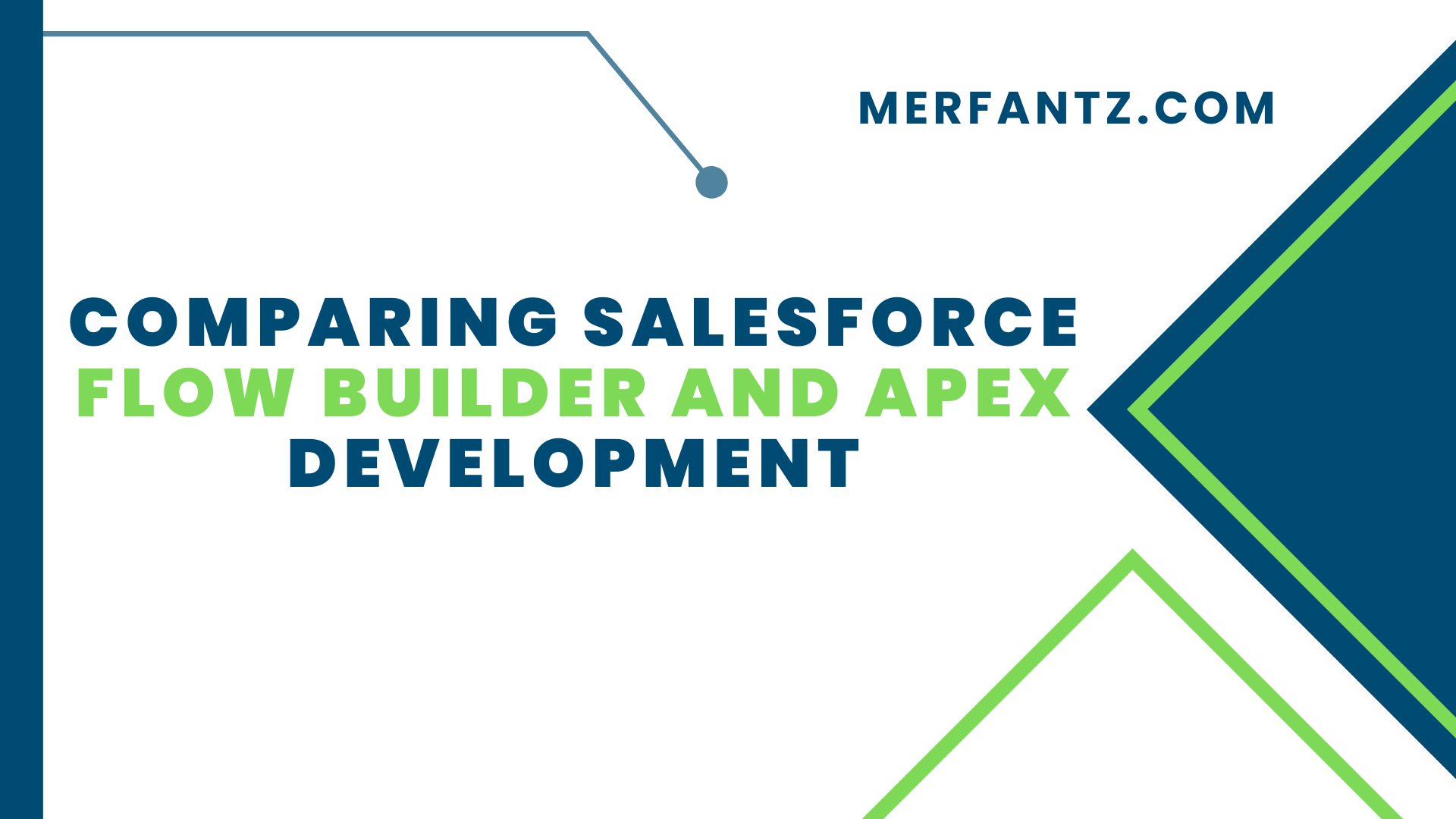In today’s rapidly evolving technological landscape, the importance of Salesforce integration cannot be overstated. At Merfantz Technologies, we take pride in being your trusted partner for seamless Salesforce customization and integration solutions that cater to the diverse needs of MNC companies. In this comprehensive guide, we’ll delve into the nuances of Salesforce integration, highlighting its significance, benefits, and how it compares to other approaches like Apex development. Our goal is to empower businesses to make informed decisions that drive efficiency, performance, and growth.
The Power of Salesforce Integration
The power of Salesforce integration lies in its ability to seamlessly connect disparate systems, applications, and data sources, fostering a unified and efficient business ecosystem. By bridging the gaps between various processes, Salesforce integration empowers organizations to harness accurate, real-time insights, streamline workflows, and enhance collaboration across departments. This synergy results in optimized operations, improved customer interactions, and the agility to adapt swiftly to market changes, ultimately driving sustainable growth and success.
At Merfantz Technologies, we specialize in harnessing this power to elevate your business. Our tailored Salesforce integration solutions are designed to align with your unique needs, whether it’s achieving data synchronization, automating routine tasks, or enabling a comprehensive view of customer interactions. With our expertise, your organization can unlock the full potential of Salesforce integration, redefining efficiency, productivity, and competitiveness in today’s dynamic business landscape.
Benefits of Seamless Integration
- Enhanced Data Accuracy: Integrating disparate systems ensures data consistency across the board, reducing errors and enabling accurate decision-making.
- Optimized Workflows: Streamlined processes lead to increased operational efficiency, minimizing manual interventions and accelerating task completion.
- 360-Degree View of Customers: Integration facilitates a comprehensive understanding of customers by consolidating data from multiple touchpoints, enabling personalized interactions.
- Improved Productivity: By automating routine tasks through integration, teams can focus on high-value activities that foster innovation and growth.
- Real-time Insights: Integrated systems provide up-to-the-minute insights, empowering businesses to respond swiftly to market changes and trends.
Salesforce Flow Builder vs. Apex: A Comparative Analysis
When considering Salesforce integration approaches, two prominent options emerge: Salesforce Flow Builder and Apex development. Each approach comes with its own set of advantages and considerations.
Salesforce Flow Builder: Empowering Business Users
Salesforce Flow Builder stands out as a user-friendly tool that empowers business users to create automated workflows and processes without delving into code. This visual interface enables the design of complex processes through a drag-and-drop approach, significantly reducing the learning curve.
Flow Builder is particularly advantageous for scenarios that demand rapid implementation and adaptability. It caters to various use cases, such as lead nurturing, approval processes, and data enrichment.
Apex Development: Unleashing Customization
On the other end of the spectrum, Apex development offers unparalleled customization and flexibility. Apex, Salesforce’s proprietary programming language, allows developers to create intricate solutions tailored to unique business requirements.
Apex is suitable for intricate integrations that demand intricate data transformations, complex calculations, or integration with legacy systems. It provides granular control but requires a higher level of technical expertise.
Example Apex Code:
public class CustomIntegration {
public void processIntegrationData() {
// Custom logic for integration
}
}
Making the Right Choice: Salesforce Integration Simplified
The decision between Salesforce Flow Builder and Apex hinges on factors such as the complexity of integration, the skillset of your team, and the project timeline. At Merfantz Technologies, we specialize in guiding you through this decision-making process, ensuring optimal outcomes for your unique business needs.
In conclusion, Salesforce integration is the cornerstone of a modern, efficient business ecosystem. Whether you opt for the simplicity of Flow Builder or the sophistication of Apex, our team is dedicated to delivering solutions that elevate your business’s efficiency, collaboration, and success.
Unlock Your Integration Potential with Merfantz Technologies
When it comes to Salesforce customization and integration for MNC companies, Merfantz Technologies stands as a beacon of excellence. Our team of experts combines industry knowledge with technical prowess to provide tailor-made solutions that align with your business goals. Contact us today to embark on a journey of seamless integration that propels your business forward.
Navigating the Integration Landscape
The integration landscape is diverse and ever-evolving, offering a plethora of tools and technologies to choose from. Let’s explore some key aspects to consider when embarking on your Salesforce integration journey.
Integration Types
Salesforce integration can take various forms:
- System Integration: Connecting different applications and systems to ensure a unified data flow and seamless user experience.
- Data Integration: Synchronizing data between Salesforce and other databases, data warehouses, or cloud platforms.
- Process Integration: Automating workflows and processes by integrating Salesforce with various tools, enabling end-to-end automation.
- User Interface (UI) Integration: Embedding Salesforce components within external applications or websites for a consistent user interface.
APIs: The Building Blocks of Integration
Application Programming Interfaces (APIs) play a pivotal role in enabling seamless communication between disparate systems. Salesforce offers a range of APIs, each catering to specific integration needs:
REST API: Ideal for integrating with mobile apps and external web services using HTTP methods for data retrieval and manipulation.
SOAP API: Facilitates the exchange of structured data using XML, suitable for complex integrations and enterprise-level applications.
Bulk API: Designed for high-volume data operations, such as loading or querying large datasets.
Platform Events: Enables event-driven integration by broadcasting events within Salesforce or to external systems.
Common Integration Challenges
While the benefits of Salesforce integration are undeniable, challenges may arise during the implementation process:
- Data Mapping and Transformation: Ensuring data consistency and compatibility between systems can be complex, especially when dealing with diverse data formats.
- Security and Authentication: Establishing secure connections between systems and managing authentication tokens requires careful consideration.
- Error Handling: Handling errors gracefully and ensuring data integrity in case of integration failures is crucial.
- Scalability: As business needs evolve, integration solutions must be scalable to accommodate growing data volumes and increased user interactions.
Best Practices for Successful Integration
To ensure a smooth and effective Salesforce integration, adhere to these best practices:
- Clearly Define Objectives: Identify your integration goals and desired outcomes from the outset.
- Choose the Right Tools: Select integration tools and technologies that align with your business requirements and technical capabilities.
- Data Governance: Establish data governance policies to maintain data accuracy, consistency, and security.
- Testing and Monitoring: Rigorously test your integration solution and implement monitoring mechanisms to detect and resolve issues proactively.
- Documentation: Maintain comprehensive documentation of your integration processes, including data mappings and workflows.
Salesforce Integration FAQ
What is Salesforce integration, and why is it important?
Salesforce integration refers to the process of connecting Salesforce with other applications, systems, or platforms to ensure seamless data flow and process automation. It’s crucial because it eliminates data silos, enhances collaboration, and provides real-time insights, leading to improved operational efficiency and informed decision-making.
What benefits can I expect from Salesforce integration?
By integrating Salesforce with other tools and systems, you can:
– Achieve data accuracy and consistency
– Streamline workflows and processes
– Gain a 360-degree view of customers
– Improve productivity through automation
– Access real-time insights for agile decision-making
How does Salesforce Flow Builder differ from Apex development for integration?
Salesforce Flow Builder is a visual tool that empowers business users to create automated workflows without coding. It’s suitable for scenarios that require quick implementation and adaptability. On the other hand, Apex development offers advanced customization and is ideal for complex integrations that demand granular control and technical expertise.
Which integration approach should I choose for my business?
The choice between Salesforce Flow Builder and Apex development depends on factors such as the complexity of integration, your team’s skillset, and project timelines. Merfantz Technologies can assess your unique requirements and guide you towards the most suitable approach for optimal results.
What is the difference between flows and Apex in Salesforce?
Flows in Salesforce are visual tools that allow business users to create automated processes without coding. Apex is a programming language used for advanced customization and complex logic.
What is the difference between process builder and Apex?
Process Builder is a user-friendly tool for creating automated processes using a visual interface. Apex is a code-based approach that offers more customization and is suitable for intricate business logic.
When would you recommend Apex over a workflow or process builder?
Apex is recommended when dealing with complex data transformations, calculations, or integrations with external systems. It offers granular control and advanced customization beyond what workflows or process builders can achieve.
How is flow better than process builder in Salesforce?
Flows offer more flexibility and capabilities compared to Process Builder. They can handle complex scenarios, guide users through specific steps, and integrate with external systems using a visual approach. Process Builder is simpler but may not cover all intricate use cases that flows can address.
Conclusion
Salesforce integration, a cornerstone of modern business operations, unlocks unparalleled efficiency, collaboration, and insights. Whether you opt for the user-friendly Salesforce Flow Builder or the robust customization of Apex development, Merfantz Technologies is your partner in realizing the true potential of your Salesforce ecosystem. Our experts are dedicated to crafting tailored solutions that align with your business objectives, ensuring that your integration journey is seamless and successful. Reach out to us today to embark on a transformative integration experience that drives your business to new heights.
Author Bio
Co-Founder & CMO at Merfantz Technologies Pvt Ltd | Marketing Manager for FieldAx Field Service Software | Salesforce All-Star Ranger and Community Contributor | Salesforce Content Creation for Knowledge Sharing






